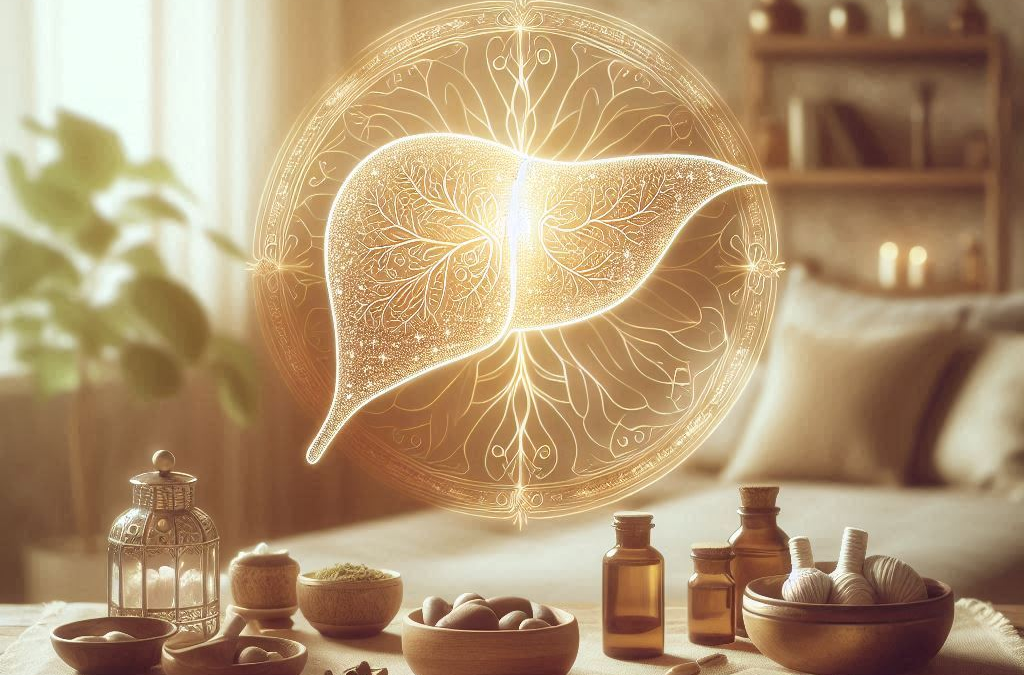Liver Cancer Care through Ayurveda: A Holistic Approach

Understanding the Link Between Fatty Liver and Liver Cancer: A Silent Threat to Health
21/08/2024
How Ayurveda Can Help Combat the Side Effects of Chemotherapy and Radiation
25/08/2024Liver cancer is one of the most challenging health
conditions, affecting millions worldwide. Ayurveda, an ancient Indian system of
medicine, offers holistic support for liver cancer patients.
In this blog, we will explore how Ayurveda can be integrated
into liver cancer care, the guiding principles behind its approach, and how
Ayurvedic practices can be used to improve liver function and well-being.
Ayurveda’s
Perspective on Liver Cancer
In Ayurveda, the liver is referred to as Yakrit and
is central to the body’s digestive and detoxifying processes. Liver cancer is
often associated with imbalances in the Pitta Dosha, which governs heat,
metabolism, and bile production in the body. When Pitta becomes aggravated due
to poor diet, stress, or toxins, it can lead to inflammation and dysfunction of
the liver.
Ayurveda views liver cancer not just as a local disease, but
as a manifestation of systemic imbalance caused by an accumulation of Ama
(toxins) and disturbed Doshas. Ayurvedic treatment aims to restore balance to
the Doshas, support the body’s natural healing mechanisms, detoxify the liver,
and improve overall vitality.
Ayurvedic
Strategies for Liver Cancer Care
Ayurveda offers therapies that enhance the healing process. These strategies
focus on detoxification, nourishing the body, and using natural remedies to
support liver function.
1. Detoxification: Panchakarma Therapy
Panchakarma is Ayurveda’s primary detoxification therapy,
designed to cleanse the body of toxins, balance the Doshas, and rejuvenate
organs. For liver cancer patients, detoxification can play a crucial role in
improving liver function and alleviating symptoms related to poor digestion and
toxin accumulation.
Some beneficial Panchakarma therapies for liver cancer care
include:
Virechana (Therapeutic Purgation): This procedure
involves the use of herbal laxatives to eliminate excess Pitta from the body,
reducing inflammation and purifying the liver.
Basti (Medicated Enemas): Herbal enemas help detoxify
the colon, indirectly supporting liver health by promoting better digestion and
toxin elimination.
Abhyanga (Oil Massage): Regular oil massage with
medicated oils helps improve circulation, calm the nervous system, and assist
in removing toxins from the body.
2.
Ayurvedic Herbs for Liver Health
Ayurveda relies on several potent herbs with
hepatoprotective, anti-inflammatory, and detoxifying properties. These herbs
can be used as supportive therapies for liver cancer patients, helping to
protect the liver from further damage and improving its regenerative capacity.
Some of the most effective Ayurvedic herbs for liver health include:
Kutki (Picrorhiza kurroa): Kutki is a powerful liver
detoxifier that helps stimulate bile production and supports liver cell
regeneration. It cools the Pitta Dosha and reduces inflammation.
Kalmegh (Andrographis paniculata): Known for its
bitter taste and potent anti-inflammatory properties, Kalmegh is a renowned
herb for treating liver disorders, including jaundice and hepatitis. It
enhances bile flow and protects the liver from toxins.
Punarnava (Boerhaavia diffusa): Punarnava is a
rejuvenating herb that supports liver regeneration and aids in removing excess
fluids and toxins from the body.
Bhumyamalaki (Phyllanthus niruri): Bhumyamalaki is
commonly used in treating liver conditions and is known for its ability to
protect the liver from oxidative stress, infections, and inflammation.
Guduchi (Tinospora cordifolia): Guduchi strengthens
the immune system and protects the liver from toxin buildup. It also enhances
liver function and helps reduce inflammation.
3. Diet
and Nutrition
Diet is an integral part of Ayurvedic care, particularly for
supporting the liver’s healing process. An Ayurvedic diet for liver cancer
patients focuses on balancing Pitta, reducing inflammation, and aiding
digestion.
Some key dietary recommendations include:
Pitta-Pacifying Foods: Focus on cooling and soothing
foods that balance Pitta, such as leafy greens, cucumber, bitter melon, and
pomegranate. These foods help reduce inflammation and support healthy bile
production.
Avoid Pitta-Aggravating Foods: Limit spicy, oily,
fried, and processed foods, which can aggravate Pitta and burden the liver.
Alcohol, caffeine, and sugary foods should also be avoided.
Herbal Teas: Regular consumption of herbal teas made
from cooling herbs like fennel, coriander, and mint can aid digestion and
detoxification.
Ghee: Ghee (clarified butter) is recommended in
moderate amounts as it nourishes the body, aids in digestion, and balances
Pitta.
Light, Easily Digestible Foods: Soups, stews, and
kitchari (a simple rice and lentil dish) are easy on the liver and help promote
healthy digestion during cancer treatment.
4.
Lifestyle Practices
In Ayurveda, lifestyle is considered as important as diet
and herbs in maintaining health. For liver cancer patients, the following
lifestyle practices can support healing and reduce stress:
Gentle Yoga and Pranayama: Simple yoga postures that
promote relaxation, combined with deep breathing exercises (pranayama), can
improve circulation, reduce stress, and support the body’s natural
detoxification processes.
Mindfulness and Meditation: Stress is a major
contributing factor to the imbalance of Doshas, so mindfulness practices,
meditation, and relaxation techniques are essential for liver cancer patients
to reduce stress and improve emotional well-being.
Adequate Rest and Sleep: Rest is vital for recovery
and healing. Ensure that you get enough sleep to allow the liver and the body
to regenerate.
Conclusion
Liver cancer care through Ayurveda offers a holistic
approach to healing that focuses on detoxification, natural herbs, diet, and
lifestyle adjustments to support liver health. By balancing the Doshas,
removing toxins, and strengthening the immune system, Ayurvedic therapies will
help liver cancer patients feel more in control of their health and well-being
during treatment.
Through a holistic and balanced approach, Ayurveda can help
liver cancer patients manage their condition more effectively, improve their
quality of life, and in overall healing journey.




